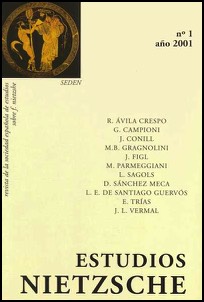¿Quién es el Nietzsche de Heidegger?
DOI:
https://doi.org/10.24310/EstudiosNIETen.vi1.8851Keywords:
Heidegger, nihilismo, olvido del serAbstract
Este texto se cuestiona acerca de quién es el Nietzsche de Heidegger. Ella no es una pregunta que sólo se le plantee a un lector extrañado por el hecho de que ese Nietzsche no coincide con un pretendido Nietzsche real, o por lo menos con ‘su’ Nietzsche, sino que es una pregunta que tenemos que hacernos para comprender la lectura allí hecha, y es una pregunta que está a la base de la larga confrontación que mantiene Heidegger con Nietzsche.
Downloads
Metrics
References
Heidegger, M, Holzwege, Frankfurt: Klostermann, 1950, p. 197, ahora en M. Heidegger, Gesamtausgabe (GA), Frankfurt: Klostermann, vol. V, pp. 213 s (Caminos de bosque, tr. H. Cortés y A. Leyte, Madrid: Alianza, 1995, p. 194).
Heidegger, M., Nietzsche, 2 vols., Pfullingen, Neske, 1961 (Nietzsche, tr. J. L. Vermal, Barcelona: Destino, 2000).
Nietzsche, F., Großoktavausgabe, Leipzig: Alfred Kröner Verlag, 1917.
Nietzsche, F., Werke. Kritische Gesamtausgabe, fundada por G. Colli y M.Montinari, y proseguida por W. Müller-Lauter y K.Pestalozzi, II vol., Berlin-New York: W. de Gruyter, 1967.
Downloads
Published
How to Cite
Issue
Section
License
As of issue 21 (2021) this journal is published only in open access (diamond route).
From that number 21, like the previous numbers published in NIETZSCHE STUDIES, they are subject to the Creative Commons Acknowledgment-NoComercia-ShareIgual 4.0 license, the full text of which can be consulted at <http://creativecommons.org/licenses/by-nc-sa/4.0 >
It is the responsibility of the authors to obtain the necessary permissions of the images that are subject to copyright.
This work is licensed under a Creative Commons Attribution-NonCommercial-ShareAlike 4.0 International License.
Copyright generates two different rights: moral rights and patrimonial rights that EJFB recognizes and respects. Moral rights are those relating to the recognition of the authorship. They are rights of a personal nature that are perpetual, inalienable, unseizable and imprescriptible as consequence of the indivisible union of the author and his/her work.
Patrimonial rights are those that can be derived from the reproduction, distribution, adaptation or communication of the work, among others.







11.png)
